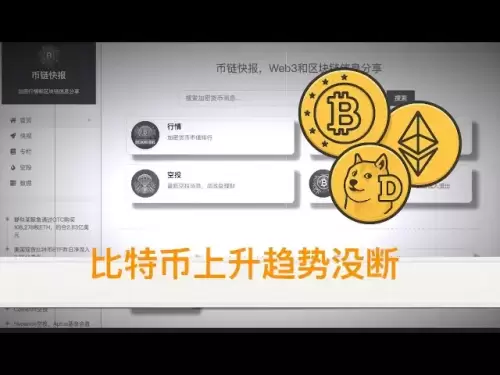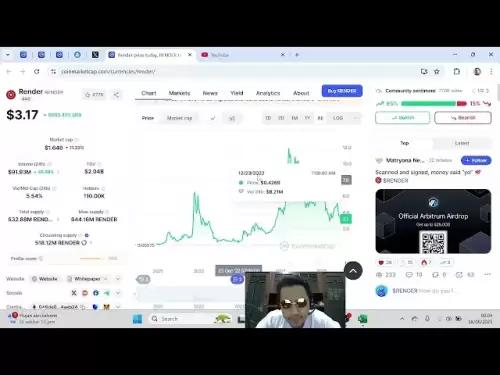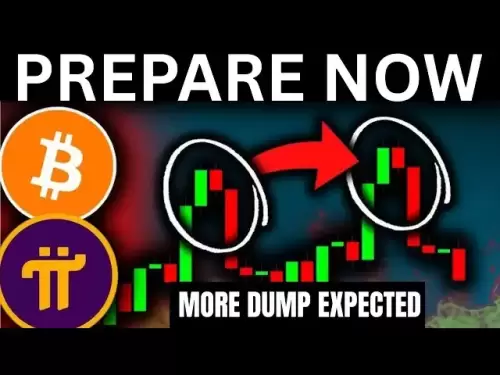-
 Bitcoin
Bitcoin $106,754.6083
1.33% -
 Ethereum
Ethereum $2,625.8249
3.80% -
 Tether USDt
Tether USDt $1.0001
-0.03% -
 XRP
XRP $2.1891
1.67% -
 BNB
BNB $654.5220
0.66% -
 Solana
Solana $156.9428
7.28% -
 USDC
USDC $0.9998
0.00% -
 Dogecoin
Dogecoin $0.1780
1.14% -
 TRON
TRON $0.2706
-0.16% -
 Cardano
Cardano $0.6470
2.77% -
 Hyperliquid
Hyperliquid $44.6467
10.24% -
 Sui
Sui $3.1128
3.86% -
 Bitcoin Cash
Bitcoin Cash $455.7646
3.00% -
 Chainlink
Chainlink $13.6858
4.08% -
 UNUS SED LEO
UNUS SED LEO $9.2682
0.21% -
 Avalanche
Avalanche $19.7433
3.79% -
 Stellar
Stellar $0.2616
1.64% -
 Toncoin
Toncoin $3.0222
2.19% -
 Shiba Inu
Shiba Inu $0.0...01220
1.49% -
 Hedera
Hedera $0.1580
2.75% -
 Litecoin
Litecoin $87.4964
2.29% -
 Polkadot
Polkadot $3.8958
3.05% -
 Ethena USDe
Ethena USDe $1.0000
-0.04% -
 Monero
Monero $317.2263
0.26% -
 Bitget Token
Bitget Token $4.5985
1.68% -
 Dai
Dai $0.9999
0.00% -
 Pepe
Pepe $0.0...01140
2.44% -
 Uniswap
Uniswap $7.6065
5.29% -
 Pi
Pi $0.6042
-2.00% -
 Aave
Aave $289.6343
6.02%
What blockchain networks does MetaMask support?
MetaMask primarily supports Ethereum and EVM-compatible blockchains like Polygon & Binance Smart Chain, requiring careful network detail input from trusted sources to avoid scams. Gas fees vary significantly across networks.
Mar 11, 2025 at 05:46 pm
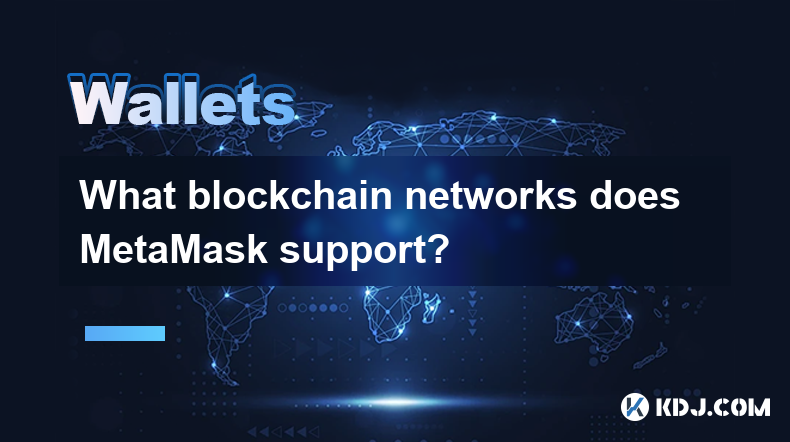
Key Points:
- MetaMask's primary support lies with Ethereum and its associated networks.
- It extends compatibility to other EVM-compatible chains, offering a broad range of choices.
- Adding new networks involves navigating MetaMask's settings and inputting specific network details.
- Security is paramount; only add networks from trusted sources to prevent scams.
- Understanding network fees (gas) and their variations across different chains is crucial.
What Blockchain Networks Does MetaMask Support?
MetaMask, a widely-used browser extension and mobile app, serves as a gateway to the decentralized world of blockchain technology. While many associate it solely with Ethereum, its functionality extends significantly beyond this single network. Understanding the breadth of MetaMask's network support is crucial for navigating the diverse landscape of cryptocurrencies and decentralized applications (dApps).
The core functionality of MetaMask is built around the Ethereum blockchain. This means interacting with Ethereum-based tokens, smart contracts, and decentralized finance (DeFi) applications is seamless. Ethereum's robust ecosystem makes it a cornerstone of MetaMask's support. However, MetaMask's capabilities aren't limited to Ethereum alone.
MetaMask's strength lies in its support for Ethereum Virtual Machine (EVM)-compatible blockchains. EVM compatibility means these networks utilize a similar programming language to Ethereum, allowing for the execution of smart contracts and interaction with dApps built for Ethereum. This significantly expands the number of networks accessible through MetaMask.
Some popular EVM-compatible networks supported by MetaMask include Polygon (MATIC), Binance Smart Chain (BSC), Avalanche (AVAX), Optimism, Arbitrum, and many others. Each of these offers unique advantages, such as faster transaction speeds or lower fees, compared to the Ethereum mainnet. The choice of network often depends on the specific dApp or token being used.
Adding New Networks to MetaMask
Adding a new network to MetaMask requires navigating the settings within the application. The process is generally straightforward but demands careful attention to detail to avoid errors.
- Access Network Settings: Open MetaMask and locate the settings menu, usually represented by three dots or a gear icon.
- Add Network: Look for an option to add a custom network or manage networks. This may be labeled differently depending on the MetaMask version.
Input Network Details: You will be prompted to provide specific information for the network you want to add. This typically includes:
- Network Name: The official name of the network (e.g., Polygon Mainnet).
- New RPC URL: A unique address identifying the network's nodes. This is crucial and must be obtained from a trusted source for the specific network.
- Chain ID: A numerical identifier for the network.
- Currency Symbol: The symbol used for the native token of the network (e.g., MATIC for Polygon).
- Block Explorer URL: A link to a website that allows you to explore transactions and blocks on the network.
- Save Changes: Once all the details are correctly entered, save the changes to add the new network to your MetaMask wallet. Double-check the information to ensure accuracy.
Security Considerations When Adding Networks
Adding custom networks to MetaMask carries a security risk if not done carefully. Always obtain network details from official sources like the network's website or reputable documentation. Never add networks from untrusted websites or individuals, as this could expose your wallet to scams or malicious attacks.
Be wary of phishing attempts that might provide fake network details to steal your funds. Verify the source meticulously before inputting any information. If in doubt, consult the official documentation of the network you intend to add. Protecting your funds is paramount.
Understanding Network Fees (Gas)
Transaction fees, often called "gas" fees, vary significantly across different blockchain networks. Ethereum's mainnet is known for potentially high gas fees, particularly during periods of network congestion. EVM-compatible networks often offer lower gas fees, making them attractive alternatives.
The gas fees are directly related to the computational resources required to process a transaction. More complex transactions, such as interacting with complex smart contracts, will generally incur higher gas fees. Checking the estimated gas fees before confirming a transaction is always advisable.
Common Questions:
Q: Does MetaMask support Bitcoin?
A: No, MetaMask does not directly support Bitcoin. It primarily focuses on Ethereum and EVM-compatible blockchains. For Bitcoin interaction, you would need a different wallet.
Q: Can I add any blockchain to MetaMask?
A: No, you can't add just any blockchain. MetaMask primarily supports Ethereum and EVM-compatible blockchains. Non-EVM compatible chains require different wallet software.
Q: What happens if I enter incorrect network details?
A: Entering incorrect network details might prevent you from interacting with the intended network or, in worst-case scenarios, lead to loss of funds if interacting with malicious networks.
Q: Are there any fees associated with adding a new network?
A: There are no fees associated with adding a new network to your MetaMask wallet. However, interacting with the network will still involve transaction fees (gas).
Q: How do I remove a network from MetaMask?
A: Usually, within the network settings, there's an option to remove or delete a custom network. Refer to MetaMask's help documentation for specific instructions.
Disclaimer:info@kdj.com
The information provided is not trading advice. kdj.com does not assume any responsibility for any investments made based on the information provided in this article. Cryptocurrencies are highly volatile and it is highly recommended that you invest with caution after thorough research!
If you believe that the content used on this website infringes your copyright, please contact us immediately (info@kdj.com) and we will delete it promptly.
- 2025-W Uncirculated American Gold Eagle and Dr. Vera Rubin Quarter Mark New Products
- 2025-06-13 06:25:13
- Ruvi AI (RVU) Leverages Blockchain and Artificial Intelligence to Disrupt Marketing, Entertainment, and Finance
- 2025-06-13 07:05:12
- H100 Group AB Raises 101 Million SEK (Approximately $10.6 Million) to Bolster Bitcoin Reserves
- 2025-06-13 06:25:13
- Galaxy Digital CEO Mike Novogratz Says Bitcoin Will Replace Gold and Go to $1,000,000
- 2025-06-13 06:45:13
- Trust Wallet Token (TWT) Price Drops 5.7% as RWA Integration Plans Ignite Excitement
- 2025-06-13 06:45:13
- Ethereum (ETH) Is in the Second Phase of a Three-Stage Market Cycle
- 2025-06-13 07:25:13
Related knowledge
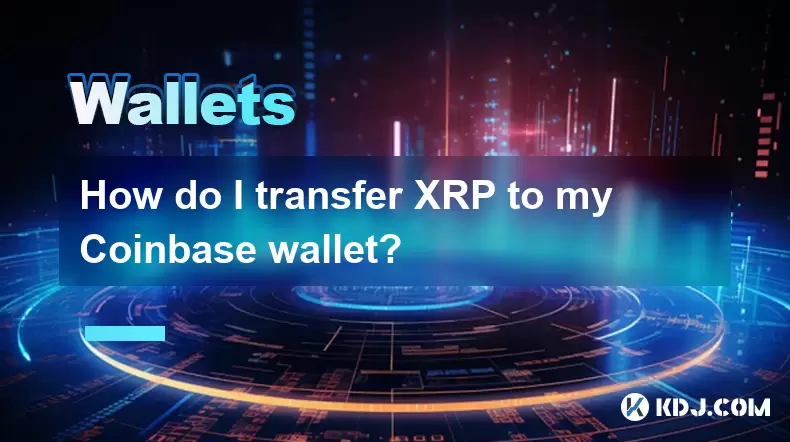
How do I transfer XRP to my Coinbase wallet?
Jun 16,2025 at 04:57pm
Understanding the Basics of XRP and Coinbase CompatibilityBefore initiating any transfer, it’s essential to confirm whether Coinbase supports XRP. As of recent updates, Coinbase has resumed offering XRP trading services on its platform after a period of uncertainty due to legal issues involving Ripple Labs. However, availability may vary depending on yo...

How do I deposit BNB into my Trust Wallet?
Jun 15,2025 at 03:56pm
Understanding BNB and Trust Wallet CompatibilityBefore initiating a deposit, it’s crucial to understand what BNB is and how it interacts with Trust Wallet. BNB (Binance Coin) is a utility token created by the Binance exchange. It can be used for paying transaction fees, participating in token sales, and more. Trust Wallet, on the other hand, is a mobile...
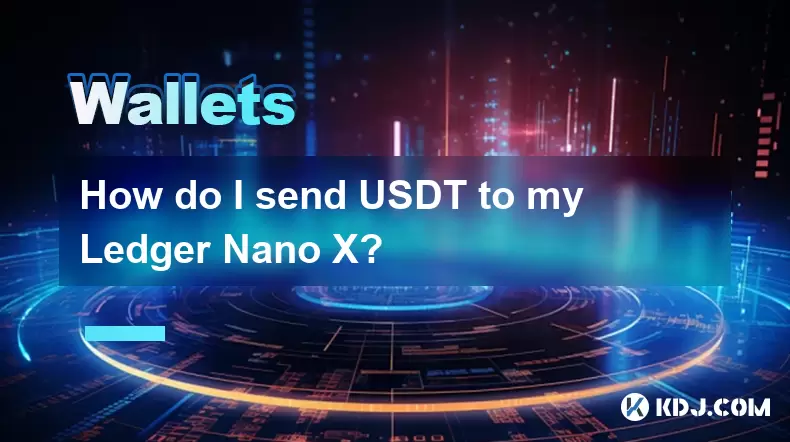
How do I send USDT to my Ledger Nano X?
Jun 15,2025 at 06:28am
What is USDT and Why Use Ledger Nano X?USDT, also known as Tether, is one of the most widely used stablecoins in the cryptocurrency ecosystem. It operates on various blockchain networks such as Ethereum (ERC-20), Tron (TRC-20), and others, offering users a digital asset pegged 1:1 to the US dollar. When it comes to storing USDT securely, hardware wallet...
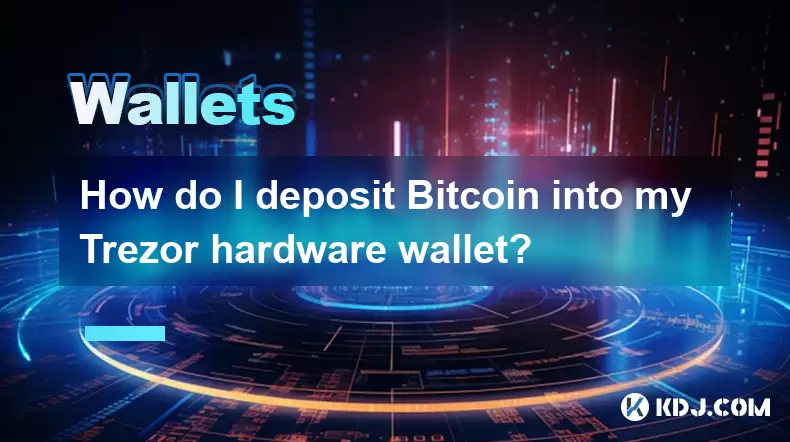
How do I deposit Bitcoin into my Trezor hardware wallet?
Jun 14,2025 at 12:29pm
What is a Trezor Hardware Wallet?A Trezor hardware wallet is a secure device designed to store cryptocurrencies offline, protecting them from online threats. Unlike software wallets, which are vulnerable to hacking and malware, Trezor stores private keys on the physical device itself. This ensures that transactions can only be approved by physically int...
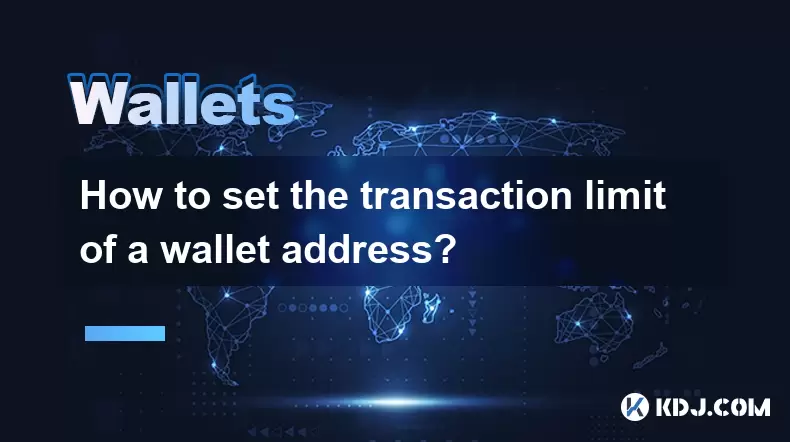
How to set the transaction limit of a wallet address?
Jun 16,2025 at 04:08am
Understanding the Concept of Transaction Limits in Cryptocurrency WalletsIn the cryptocurrency ecosystem, transaction limits refer to predefined restrictions placed on the amount of digital assets that can be sent or received by a wallet address within a specified timeframe. These limits are typically enforced by platforms such as exchanges, custodial w...
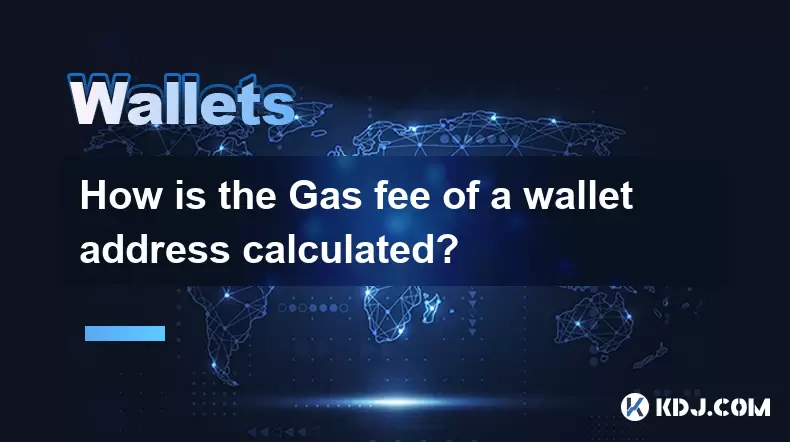
How is the Gas fee of a wallet address calculated?
Jun 14,2025 at 07:57pm
Understanding the Basics of Gas Fees in Blockchain TransactionsIn the cryptocurrency ecosystem, particularly within Ethereum-based networks, a Gas fee is an essential component of executing transactions or smart contract operations. The Gas fee serves as compensation for miners or validators who process and confirm transactions on the blockchain. It is ...

How do I transfer XRP to my Coinbase wallet?
Jun 16,2025 at 04:57pm
Understanding the Basics of XRP and Coinbase CompatibilityBefore initiating any transfer, it’s essential to confirm whether Coinbase supports XRP. As of recent updates, Coinbase has resumed offering XRP trading services on its platform after a period of uncertainty due to legal issues involving Ripple Labs. However, availability may vary depending on yo...

How do I deposit BNB into my Trust Wallet?
Jun 15,2025 at 03:56pm
Understanding BNB and Trust Wallet CompatibilityBefore initiating a deposit, it’s crucial to understand what BNB is and how it interacts with Trust Wallet. BNB (Binance Coin) is a utility token created by the Binance exchange. It can be used for paying transaction fees, participating in token sales, and more. Trust Wallet, on the other hand, is a mobile...

How do I send USDT to my Ledger Nano X?
Jun 15,2025 at 06:28am
What is USDT and Why Use Ledger Nano X?USDT, also known as Tether, is one of the most widely used stablecoins in the cryptocurrency ecosystem. It operates on various blockchain networks such as Ethereum (ERC-20), Tron (TRC-20), and others, offering users a digital asset pegged 1:1 to the US dollar. When it comes to storing USDT securely, hardware wallet...

How do I deposit Bitcoin into my Trezor hardware wallet?
Jun 14,2025 at 12:29pm
What is a Trezor Hardware Wallet?A Trezor hardware wallet is a secure device designed to store cryptocurrencies offline, protecting them from online threats. Unlike software wallets, which are vulnerable to hacking and malware, Trezor stores private keys on the physical device itself. This ensures that transactions can only be approved by physically int...

How to set the transaction limit of a wallet address?
Jun 16,2025 at 04:08am
Understanding the Concept of Transaction Limits in Cryptocurrency WalletsIn the cryptocurrency ecosystem, transaction limits refer to predefined restrictions placed on the amount of digital assets that can be sent or received by a wallet address within a specified timeframe. These limits are typically enforced by platforms such as exchanges, custodial w...

How is the Gas fee of a wallet address calculated?
Jun 14,2025 at 07:57pm
Understanding the Basics of Gas Fees in Blockchain TransactionsIn the cryptocurrency ecosystem, particularly within Ethereum-based networks, a Gas fee is an essential component of executing transactions or smart contract operations. The Gas fee serves as compensation for miners or validators who process and confirm transactions on the blockchain. It is ...
See all articles























